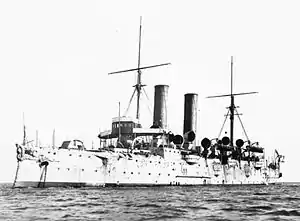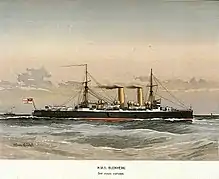HMS Blenheim (1890)
HMS Blenheim was a Blake-class first class protected cruiser that served in the Royal Navy from 1890–1926. She was built by Thames Ironworks & Shipbuilding Company at Leamouth, London. The ship was named after the Battle of Blenheim.
 HMS Blenheim | |
| History | |
|---|---|
| Name: | HMS Blenheim |
| Builder: | Thames Ironworks & Shipbuilding Company, Leamouth, London |
| Laid down: | October 1888 |
| Launched: | 5 July 1890 |
| Commissioned: | 1891 |
| Decommissioned: | 1926 |
| Reclassified: | Depot ship 1907 |
| Fate: | Sold for breaking up 13 July 1926 |
| General characteristics | |
| Class and type: | Blake-class protected cruiser |
| Displacement: | 9,150 tons |
| Length: | 375 ft (114 m) |
| Beam: | 65 ft (20 m) |
| Propulsion: |
|
| Speed: | 22 knots (41 km/h) |
| Armament: |
|
Description
Launched 5 July 1890, she displaced 9,150 tons and her steel hull measured 375 feet (114 m) (length) and 65 feet (20 m) (beam) with 20,000 indicated horsepower (15,000 kW) turning 2 propellers giving a top speed of 22 knots (41 km/h). Her main armament was two BL 9.2 inch Mk VI guns (234 mm) and six QF 6 inch guns (152 mm) on the upper deck,[1] and four QF 6 inch guns in 150 mm compound armoured casemates on the main deck.[1] She also carried sixteen 3-pounders,[1] and four 14 inch torpedo tubes (two submerged and two above water).[1]
Service history

She was commissioned at Chatham on 1 January 1891.
Sitting Canadian Prime Minister Sir John Thompson died in England, just after being named to Queen Victoria's Privy Council in December 1894 and was repatriated to Halifax, Nova Scotia by Blenheim, which was painted black for the occasion.[2]
Prince Henry of Battenberg died from malaria while on active duty on board HMS Blonde off Sierra Leone in January 1896. Blenheim repatriated his body from the Canary Islands. Queen Victoria appointed the commanding officer Captain Edmund S. Poe to the fourth class of the Royal Victorian Order as a mark of appreciation for this service.
She was commissioned at Chatham by Captain Frank Hannam Henderson on 2 January 1901 with a complement of 593 men,[3] to serve at the China station to support the British position during the Boxer Rebellion.[4][5] In June 1902 she visited Nagasaki,[6] and the following month Captain Frederick George Stopford was appointed in command.[7]
She served as a cruiser with the Channel Squadron until May 1908 when she joined the Mediterranean Fleet as a destroyer depot ship. Whilst being used as a depot ship, future Rear-Admiral and VC winner Eric Gascoigne Robinson served aboard her. She was sent to Mudros in March 1915 in support of the Mediterranean Expeditionary Force at the Battle of Gallipoli. Later that year, Blenheim repatriated former Canadian Prime Minister Sir Charles Tupper who had died in England in 1915 to Halifax.
She was scrapped in 1926 at Pembroke Dock.
Notes
- Jane's Fighting Ships 1900, page 91.
Conway's All the World's Fighting Ships 1860–1905, page 66.
Note that Jane's suggests that the 6 inch guns were probably the older 26 calibre BL guns converted to QF. However Conways confirms that the guns were 6 inch QF. - Sir John Thompson Edmonton Catholic School District
- "Naval & Military intelligence". The Times (36340). London. 1 January 1901. p. 12.
- "Naval & Military intelligence". The Times (36337). London. 28 December 1900. p. 5.
- "Naval & Military intelligence". The Times (36396). London. 7 March 1901. p. 11.
- "Naval & Military intelligence". The Times (36800). London. 21 June 1902. p. 12.
- "Naval & Military intelligence". The Times (36820). London. 15 July 1902. p. 11.
References
- Colledge, J. J.; Warlow, Ben (2006) [1969]. Ships of the Royal Navy: The Complete Record of all Fighting Ships of the Royal Navy (Rev. ed.). London: Chatham Publishing. ISBN 978-1-86176-281-8.
- Roger Chesneau and Eugene M. Kolesnik, ed., Conway's All The World's Fighting Ships, 1860–1905, (Conway Maritime Press, London, 1979), ISBN 0-85177-133-5
- Warship International Staff (2015). "International Fleet Review at the Opening of the Kiel Canal, 20 June 1895". Warship International. LII (3): 255–263. ISSN 0043-0374.
External links
| Wikimedia Commons has media related to HMS Blenheim (ship, 1891). |
- "Royal Navy Log Books - HMS Blenheim". Retrieved 15 December 2013. Transcription of ship's logbooks May 1914 to August 1917
